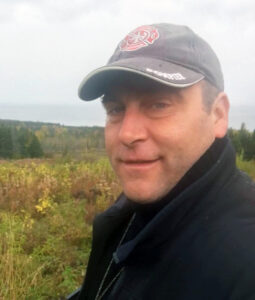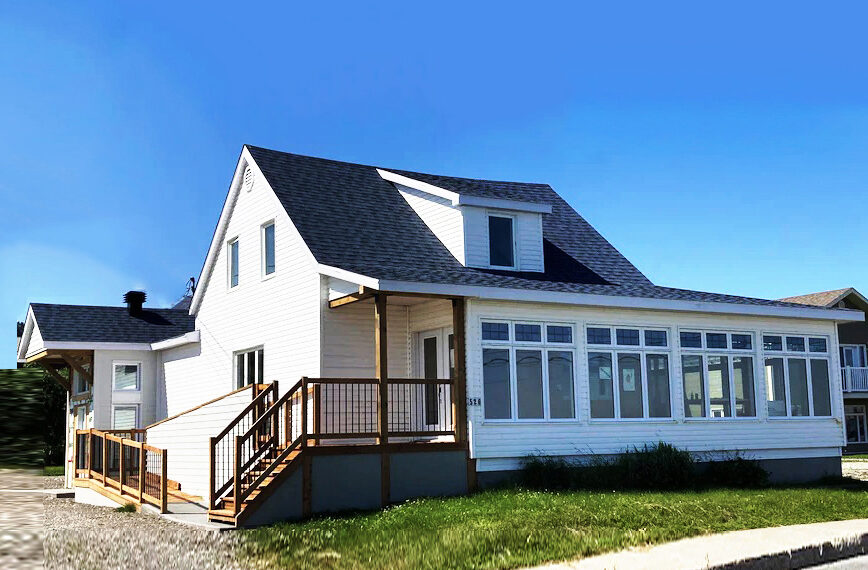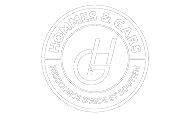Helping Fathers and Valuing their Role
 A father who stands with arms wide open before his son taking his first steps. An attentive father preparing breakfast for his daughter. “It’s little everyday gestures like these that show us the beauty of our work,” explained Mathieu Michaud, Maison Oxygène Haute-Gaspésie Coordinator. Have you ever heard of Maison Oxygène? It opened in 2021 and is based in Sainte-Anne-des-Monts, offering help to fathers in difficulty. What kind of services does it offer? How does it help dads? And what advice can be given to fathers who want to create more of a bond with their child? We caught up with Mathieu to find out.
A father who stands with arms wide open before his son taking his first steps. An attentive father preparing breakfast for his daughter. “It’s little everyday gestures like these that show us the beauty of our work,” explained Mathieu Michaud, Maison Oxygène Haute-Gaspésie Coordinator. Have you ever heard of Maison Oxygène? It opened in 2021 and is based in Sainte-Anne-des-Monts, offering help to fathers in difficulty. What kind of services does it offer? How does it help dads? And what advice can be given to fathers who want to create more of a bond with their child? We caught up with Mathieu to find out.
What is Maison Oxygène Haute-Gaspésie?
When you think of the name “Maison Oxygène,” you think it’s a place to catch your breath, put your feet up, and get back on track. And that’s exactly what it is. Because at Maison Oxygène Haute-Gaspésie “we welcome dads with kindness and respect. We listen to their distress. We assess their needs. We support them in the things they want to work on, one by one,” explained Mathieu.
Maison Oxygène Haute-Gaspésie “is a resource for father-child support and accommodation. Our mission is to consolidate, maintain, and preserve the ties between fathers and their children. We offer residential, outpatient, and related services. In all cases, a father admitted to Maison Oxygène must want to work on the fatherhood aspect of his life,” continued the specialized educator. How does it work?
Three Ways to Support Fathers
“For accommodation services, the name says it all. We offer a roof over their heads, so that fathers don’t lose touch with their children. It’s often during a separation that they come to us, or during an eviction. It gives them a place to receive their children. Because if the father ends up on a friend’s sofa, chances are they won’t be able to accommodate his children. At Maison Oxygène, we have a room for him and beds for his children. We have 9 beds. We offer all the amenities: dishes, fridges, etc. The dads do the cooking themselves, and are responsible for their children,” Mathieu continued.
“For external services, it’s varied. It has to do with fatherhood and dads’ rights. Often, dads come to us who really don’t know how to go about it, and don’t really understand the steps to take. We help them with all these issues: child support, family allowances, finding a job, etc. We point them in the right direction. We refer them to local organizations. We make personalized referrals and accompany them. We always go at the dad’s pace, based on his needs,” continued Mathieu.
“Otherwise, we have a number of related services. We work to promote the father’s role and his importance in his children’s lives. We get involved in organizing activities like the “Course des papas,” which took place last June, during the “Semaine québécoise de la valorisation de la paternité” in collaboration with other organizations in the social environment. This winter, we’ll also be launching play-based learning activities called “It’s Different with Dad,” which develop the father-child bond,” he added.
Rolling Up Their Sleeves
Mathieu explained that many fathers wait until they’ve reached the end of their rope before seeking help. Maison Oxygène’s counsellors help them “roll up their sleeves, regain their balance, and get on with their lives. Often, for these fathers, problems seem like a mountain, and insurmountable. We break them up into little bits. We work on it a little at a time, and then, at some point, we realize that the bulk of the job is done, that the problems are solved bit by bit,” he explained. The support he gives fathers to work on themselves and their fathering skills, he described as a tool: “I’m the hammer, dad’s the carpenter.”
Doesn’t everyone, at one time or another, need tools to get the job done? Then don’t hesitate to ask Maison Oxygène for help. That’s what Mathieu emphasized. “Asking for help for a man is often difficult.” We try to teach dads to have the humility to ask for help. Our slogan is: Asking for help is courageous. We want to dispel the myth of the man who doesn’t need anyone. Big boys don’t cry: that’s not what we say.
At Maison Oxygène, “we’re seeing some great successes. Last year, we avoided placing two children in care because the fathers had worked on themselves,” pointed out the coordinator, who finds great satisfaction in seeing fathers progress and becoming involved in their children’s lives.
A Father is Important
And why does Maison Oxygène Haute-Gaspésie emphasize the importance of the father-child bond? Because “the father-child bond is just as important as the mother-child bond. The child observes and learns from both mom and dad’s behaviors,” replied Mathieu.
Recent studies explain the benefits of fathers’ involvement in their children’s lives. They point to benefits in terms of cognitive skills (e.g., better school results), language skills (e.g., vocabulary development) and social-emotional skills (e.g., reduced anxiety).
As Mathieu has observed, fathers are getting more and more involved. “I’m proud of the Gaspesian dads”. Apparently, dads are all present in the latest cohorts of prenatal courses here in Haute-Gaspésie. We’re also seeing more dads with diaper bags, caring for their children. I think the more involved fathers are seen and valued in society, the more it will inspire other fathers to get involved,” he added.
How Can You Bond More Closely with Your Child?
Finally, we asked Mathieu to share his tips. As a father: how can we create a stronger bond with our child?
“It’s not rocket science. To develop a bond, you have to spend time with your children. Here’s a tip: hang up the phone, put it down and play with your kids. Learning through father-child play is a winner. Then there’s basic childcare: changing diapers, brushing hair, the bedtime routine: the lullaby, reading a little story. These are the little things that help you develop a bond. It’s also about being involved in your child’s life: going to school report card meetings, accompanying your children in their extracurricular activities: encouraging them at the arena if your child plays field hockey or figure skates. That’s another way of maintaining ties,” he explained. Fathers who are present and involved realize how important it is to forge bonds with their youngsters. Being a father is the greatest adventure of a lifetime. A unique experience. Enriching. Incomparable.
Fathers are role models for their children. Being there for your children, but also knowing how to ask for help when you need it: isn’t that the best way to play this role?
Need help or information? Contact Maison Oxygène Haute-Gaspésie.



 “Every time we help a man, we help his children and his partner. It’s positive for society as a whole,” stated Marie Hudon, Assistant Executive Director of Convergence – Service d’aide aux hommes de la Gaspésie, accompanied by Jean-Jacques Élie, the organization’s counselor and Executive Director. Since its foundation, Convergence has been committed to its mission of helping the male population of the Gaspé Peninsula. Men and teenagers aged 16 and over are welcome at this organization, where they are welcomed, their needs analyzed, and non-judgement is practiced. In 12 years, nearly 2,500 different men have found help from Convergence’s team of counsellors. What services do we offer? And what tips should we know to improve our relationships with our loved ones? We met Jean-Jacques and Marie to find out.
“Every time we help a man, we help his children and his partner. It’s positive for society as a whole,” stated Marie Hudon, Assistant Executive Director of Convergence – Service d’aide aux hommes de la Gaspésie, accompanied by Jean-Jacques Élie, the organization’s counselor and Executive Director. Since its foundation, Convergence has been committed to its mission of helping the male population of the Gaspé Peninsula. Men and teenagers aged 16 and over are welcome at this organization, where they are welcomed, their needs analyzed, and non-judgement is practiced. In 12 years, nearly 2,500 different men have found help from Convergence’s team of counsellors. What services do we offer? And what tips should we know to improve our relationships with our loved ones? We met Jean-Jacques and Marie to find out.






